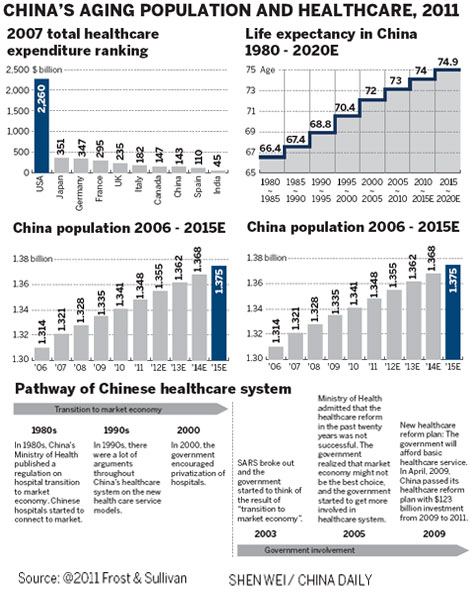Aging nation creates nursing home boom
Updated: 2011-12-05 09:09
By Tania Lee (China Daily)
|
|||||||||
Until recently, the central government's focus had predominantly been on the lower socio-economic group in rural areas, an argument that explains why there hasn't been much professional development in the sector.
"The reason why we have not done more work in China is because there was little provision in the middle-income groups and very little in the high-income area," said David Lane of ThomsonAdsett & Partners Pty Ltd, an Australian consulting company that has worked in the sector in Asia since the 1990s.
"Most of them (developers and operators) can only really support the employment of local architects with very limited international assistance," he said.

Now, with China facing an aging population, the government has welcomed private and foreign investors to help cover the shortfall in facilities for care of the elderly. Private companies dominate the nursing home sector in most major cities.
Although it is hard to determine exactly what percentage of the elderly rely almost exclusively on the family for support, a study earlier this year by US gerontologists and Chinese academics, published in the Journal of the American Geriatrics Society, indicates that the number of elderly people moving into nursing homes in Chinese cities is soaring.
The study, led by Zhanlian Feng, assistant professor of Health Services, Policy and Practice with the Center for Gerontology and Health Care Research at Brown University in the US, surveyed seven Chinese cities and discovered a growing number of care homes for senior citizens.
The ancient capital of Nanjing, in Jiangsu province, for example, had 27 homes in 1990 and 52 a decade later. By 2009, the number had risen to 148. Beijing and Tianjin showed similar growth, while Shanghai had 552
facilities by the same year.
Despite this sudden growth, many industry leaders believe that the market is still immature and has the potential for enormous growth.
ThomsonAdsett is currently working on numerous projects in Beijing and two in Shanghai, while bidding for further work in Foshan in Guangdong province, Dalian in Liaoning province, Wuxi in Jiangsu province, Wuhan in Hubei province and the municipality of Chong-qing.
"I expect the level of inquiry (from investors and developers) will continue to increase rapidly over the next five years," said Lane.
Official records also show that the number of available beds in nursing homes can only cater for 1.8 percent of China's elderly population, whereas the standard in many Western countries is between 5 and 7 percent.
"We'll need to increase the number by 3.4 million beds to accommodate 3 percent over the next five years," said Li Jianguo, vice-chairman and general-secretary of the Standing Committee of the National People's Congress, in March.
Over the 12th Five-Year Plan period, the government intends to increase pension coverage, expand home-care services and build more nursing homes. But despite their push for more outside input and more favorable policies on land, water, power and taxation in the elderly care sector, businesses are aware of the loopholes and the financial risks - particularly because of the great degree of apprehension about how the general public views care for the elderly and retirement facilities.











